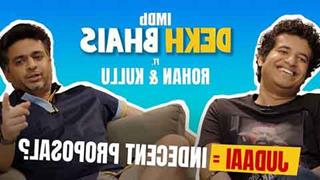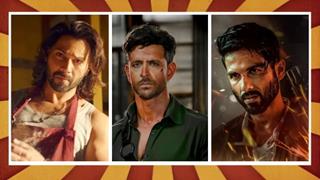Directed by: Kelly Asbury and Conrad Vernon
Voices: Mike Myers, Eddie Murphy, Cameron Diaz, Julie Andrews and John Cleese.
Not for a long time will you get to see a film that tickles your senses so. "Shrek 2" makes you smile, giggle, chortle and chuckle. And cry.
Its surprising bouts of sighing romanticism where the commoner ogre-hero tries to be his best before his wife's upper class parents (shades of "Raja Hindustani", yes?) also make you want to reach for your handkerchief. All this, and a lot more, in a film where all the characters are animation figures.
Virtual reality never appeared more tenable... or desirable. And for those who thought a sequel to the hugely successful "Shrek" in 2001 was one more take-the-money-and-ram proposals, there's news. "Shrek 2" is funnier, sassier, more savvy and enjoyable than even the first, considerably spectacular film.
The "Shrek" series (and I hope it's a series since the sequel whets the appetite for more) represents the triumph of the fairytale spirit against all odds and all cynical readings of age-old literary/cinematic customs. It does away with the syrupy idealism of the fairytale convention but holds on to the romanticism and the "purity" of the love-emotion. For those who weren't around when Shrek first shrieked into sight, he's a green monster and the envy of the animation genre. On a superficial level, "Shrek" gives us a walloping entertainer filled with zany humour and anachronistic overtures and packaged in an irresistible insouciance.
For those who weren't around when Shrek first shrieked into sight, he's a green monster and the envy of the animation genre. On a superficial level, "Shrek" gives us a walloping entertainer filled with zany humour and anachronistic overtures and packaged in an irresistible insouciance.
On a subliminal level, Shrek represents the triumph of physical non-beauty over scratch-level perfection. He's a green ungainly blob of god knows what. But he's gentle, kind, caring and shrewd. He's ET without spatial affectations.
And most important of all, he speaks in the voice of Mike (Austin Powers) Myers. That helps tremendously to give the character its peculiar propensities as an animation character with "real" feelings. In fact, the performances are all pitched perfectly through the voices. Whether it's Shrek's wife, Princess Fiona speaking in Cameron Diaz's whispering tones, or her father King Harold whose morally compromised yet finally conscientious character comes through John Cleese's baritone, the film rocks visually through the spoken word.
In fact, the performances are all pitched perfectly through the voices. Whether it's Shrek's wife, Princess Fiona speaking in Cameron Diaz's whispering tones, or her father King Harold whose morally compromised yet finally conscientious character comes through John Cleese's baritone, the film rocks visually through the spoken word.
Much cleverer and far smarter than a 'children's film' (whatever that may be), and much more real than many romantic comedies in Hollywood and Bollywood with human characters, "Shrek" is a trek into fantasyland undertaken in the spirit of a pilgrimage.
The meet-the-parents format where the ogre-hero meets up with his wife's aristocratic parents flares up into scenes of high comedy. The editing of the sequence where Shrek and his wife walk through a royal gauntlet towards her parents is amazingly astute. The dialogues are brought together in a comic contingency.
The sinister overtones, such as the transvestite bartender at the cavern where the evil fairy godmother plots to oust Shrek from Princess Fiona's life, or the subverted self-absorbed interpretation of the mythic Prince Charming (speaking appropriately in the voice of Rupert Everett) symbolises the highest form of pop art delineated in the most flamboyant shades.  The adventure story cascades into an endearingly enchanting mix of pure fun and distant enigma.
The adventure story cascades into an endearingly enchanting mix of pure fun and distant enigma.
The distance that this delightful film covers from fantasy to virtual reality is so beautifully carpeted with subtle lessons on the quality of existence that we don't even know when the joyride begins and ends. After "Spiderman 2", here's another Hollywood nugget that disproves our scepticism about sequels.
Shrek 2
Friday, August 20, 2004 15:48 IST














